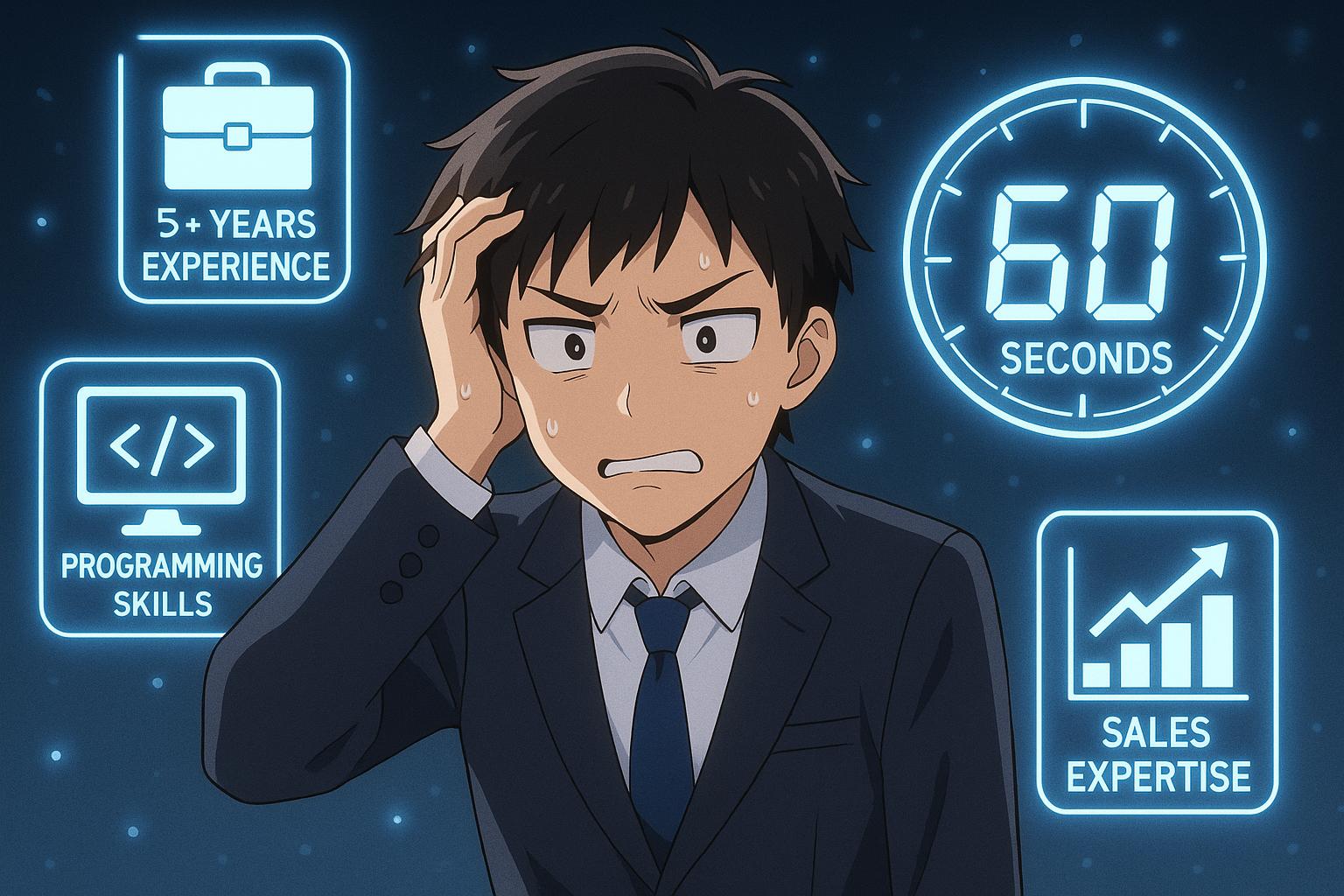A viral Reddit post revealing a candidate rejected for lacking five years’ experience in a tool released only last year highlights growing frustration over unrealistic job requirements, automated hiring pitfalls, and age discrimination in today’s recruitment landscape.
The modern job market is increasingly marked by disconnects between candidate qualifications and employer expectations, a reality starkly illuminated by a recent viral Reddit post. In an unsettling twist, a user known as “Career_By_Mustafa” shared their experience of being rejected from a job for not possessing five years of experience in a tool that had only been launched in 2023. This scenario has sparked widespread discussions about the nature of job descriptions and the practical ramifications of hiring practices that seem to demand the impossible.
In their post, the user elaborated on their excitement about the job opportunity, only to be met with a sobering rejection notice citing their lack of experience with a recently introduced tool. Notably, the job description also sought candidates with extensive experience—over five years—in a fast-paced environment, as well as a demonstrated versatility to adapt quickly. With a sardonic comparison, the user remarked, “Company: ‘Must walk on water.’ Me: ‘I can swim.’ Company: ‘Sorry, not good enough.’” This satirical take encapsulated a sentiment echoed by many, revealing a growing frustration among job seekers who feel that unrealistic qualifications are becoming the norm rather than the exception.
Social media reactions to the post added depth to this conversation, with many commenters sharing similar tales of rejections stemming from absurdly specific criteria. One user quipped that companies seem to be searching for “a time traveller,” while another highlighted an all-too-common issue: job listings often consolidated without a meaningful understanding of the required technical proficiencies. “I’ve seen job posts demanding four years of experience in software that’s only two years old. It’s become a running joke,” noted one commenter. Such statements resonate within a broader context where candidates find themselves at an increasing disadvantage due to inflated expectations.
Amidst this, the use of automated systems in hiring processes has emerged as another point of contention. In a separate but related incident, a job applicant at SafetyCulture was rejected within a mere minute after submitting their application, which prompted discussions about the effectiveness and fairness of automation in recruitment. Such rapid rejections not only raise questions about transparency but also suggest a potential disconnection between automated systems and the nuanced understanding required for evaluating candidate suitability. Critics argue that such practices can undermine the potential for a fair assessment, leading to a recruitment process that fails to appreciate individual qualifications.
Moreover, the landscape of job hunting has evolved to reflect a somewhat desperate reality for many applicants. Anecdotal accounts reveal job seekers facing staggering rejection rates, with some reporting over 600 applications submitted in just six months. This has ignited conversations about the overall state of the job market, the efficacy of traditional hiring practices, and the shifting expectations employers hold for prospective employees.
However, the challenges are not confined to technological issues alone. Cases of age discrimination also play a significant role in complicating the job search experience. Older candidates have voiced frustrations about rejections based on supposedly insufficient experience, even when they possess ample credentials. This intersection of ageism and unrealistic experience requirements adds yet another layer of complexity to an already challenging job market.
As discussions unfold, it becomes increasingly clear that the gap between hiring criteria and the realities of experience is not merely a comedic anecdote but a significant issue demanding attention. The prevailing sentiment among job seekers is one of inquiry: how can employers reconcile their expectations with the current landscape of skills, availability, and experience? As professionals navigate these trying waters, the call for a more humane and understanding hiring process is more pertinent than ever.
Reference Map:
- Paragraph 1 – [1], [2]
- Paragraph 2 – [1], [2]
- Paragraph 3 – [3], [4]
- Paragraph 4 – [5]
- Paragraph 5 – [6]
Source: Noah Wire Services
- https://www.indiatoday.in/amp/trending-news/story/job-seekers-rejected-for-5-years-experience-in-new-tool-viral-reddit-post-2730165-2025-05-25 – Please view link – unable to able to access data
- https://www.indiatoday.in/amp/trending-news/story/job-seekers-rejected-for-5-years-experience-in-new-tool-viral-reddit-post-2730165-2025-05-25 – A Reddit user shared their experience of being rejected for a job due to lacking five years of experience in a tool released in 2023. This sparked discussions about unrealistic job descriptions and hiring practices. Social media users highlighted the issue of job listings demanding experience in tools that are relatively new, leading to frustration among job seekers.
- https://www.livemint.com/news/job-applicant-rejected-in-60-seconds-ignites-debate-on-automated-hiring-and-recruitment-fairness-11740743601666.html – A job seeker was rejected within a minute of applying for a position at SafetyCulture, raising concerns about automated hiring processes and recruitment fairness. The rapid rejection led to debates about the efficiency and transparency of automated systems in recruitment, highlighting potential issues in the hiring process.
- https://timesofindia.indiatimes.com/etimes/trending/job-rejection-in-60-seconds-the-hiring-nightmare-thats-sparking-outrage-online/articleshow/118629317.cms – A Reddit user recounted being rejected just one minute after applying for a Customer Success Manager role, prompting discussions about transparency and fairness in hiring. The swift rejection suggests the use of automated systems in recruitment, raising questions about their impact on job seekers and the hiring process.
- https://www.dailydot.com/culture/desperation-job-forums-2025/ – Job seekers are sharing stories of numerous rejections, with some reporting over 600 in six months. Despite extensive experience, many are finding it challenging to secure employment, leading to discussions about the state of the job market and the effectiveness of current hiring practices.
- https://www.glassdoor.com/Community/job-hunting-in-tech/have-been-applying-for-a-few-roles-recently-and-being-rejected-as-having-insufficient-experience-for-each-role-i-have – A user expressed frustration over being rejected for roles despite having more than the required experience, suspecting age discrimination. This highlights concerns about ageism in the hiring process and the challenges faced by older job seekers in the tech industry.
- https://www.businessinsider.com/why-your-resume-gets-rejected-job-search-bots-people-ats-2024-5 – An article discussing the reasons behind résumé rejections, emphasizing that it’s often recruiters, not bots, who make the decision. It highlights the importance of human judgment in the hiring process and the need for applicants to stand out beyond automated systems.
Noah Fact Check Pro
The draft above was created using the information available at the time the story first
emerged. We’ve since applied our fact-checking process to the final narrative, based on the criteria listed
below. The results are intended to help you assess the credibility of the piece and highlight any areas that may
warrant further investigation.
Freshness check
Score:
8
Notes:
The narrative is fresh, with the earliest known publication date being May 25, 2025. The Reddit post was shared by ‘Career_By_Mustafa’ on May 25, 2025, and subsequently reported by India Today on the same date. No earlier versions with differing figures, dates, or quotes were found. The report is based on a recent Reddit post, which typically warrants a high freshness score. No discrepancies or recycled content were identified.
Quotes check
Score:
9
Notes:
The direct quote from the Reddit post, ‘Company: ‘Must walk on water.’ Me: ‘I can swim.’ Company: ‘Sorry, not good enough.”, appears to be original and exclusive to this narrative. No identical quotes were found in earlier material, and no variations in wording were noted. This suggests the content is original.
Source reliability
Score:
7
Notes:
The narrative originates from India Today, a reputable news organisation. However, the report is based on a Reddit post, which is user-generated content and may not always be verified. While India Today provides a level of reliability, the original source’s credibility is uncertain. The Reddit user ‘Career_By_Mustafa’ has no verifiable public presence, which raises questions about the authenticity of the account.
Plausability check
Score:
8
Notes:
The claim that a job seeker was rejected for lacking five years’ experience in a tool launched in 2023 is plausible, given the increasing disconnect between candidate qualifications and employer expectations. Similar instances have been reported, such as a Reddit user sharing their experience of being rejected for a role due to insufficient experience in a tool released just last year. ([dailydot.com](https://www.dailydot.com/culture/desperation-job-forums-2025/?utm_source=openai)) The tone and language of the narrative are consistent with typical corporate communication. No excessive or off-topic details were noted, and the structure aligns with standard reporting.
Overall assessment
Verdict (FAIL, OPEN, PASS): OPEN
Confidence (LOW, MEDIUM, HIGH): MEDIUM
Summary:
The narrative presents a fresh and plausible account of a job seeker being rejected for lacking experience in a recently launched tool. While the report is based on a Reddit post, which is user-generated and unverifiable, the content aligns with similar reported instances. The source’s reliability is moderate due to the unverifiable nature of the original Reddit account. Further verification of the Reddit post’s authenticity is recommended to fully assess the credibility of the narrative.













